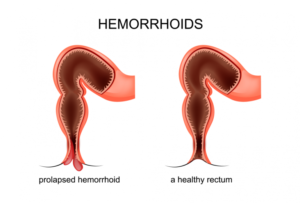Hemorrhoids or piles are a normal part of the anatomy and their presence per se does not imply a disease state.
They are caused by enlarged blood vessels that cause small swellings, either inside or outside your rectum. The blood vessels become enlarged when subjected to pressure, for example, when straining to pass stools when constipated or during childbirth. Hemorrhoids are more likely to occur if you are overweight, constipated or elderly. Hemorrhoids are usually a minor and temporary inconvenience. However, if symptoms are persistent piles specialist doctor should be able to offer advice and medication to help.


